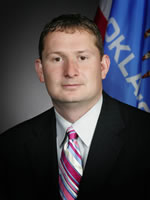In order to provide equal access and equal opportunity to people with diverse abilities, this site has been designed with accessibility in mind. Click here to view
Corn Sees Need for Budget Stabilization Legislation: Cites Falling Energy Revenues as Evidence
 Senator Kenneth Corn
Senator Kenneth Corn
Oklahoma’s declining gross production tax revenues should serve as sobering evidence that state lawmakers must take greater care in how they appropriate oil and gas revenue, a veteran State Senator said Thursday.
Senator Kenneth Corn, a Democrat from Poteau, said Tuesday’s state revenue report is exactly why he believes the state needs a Constitutional amendment limiting use of excess gross production tax revenue to one-time expenditures.
State Treasurer Scott Meacham reported Tuesday oil and gas revenue for the first six months of the current fiscal year are nearly $50 million below revenues for the same period last year and more than $60 million below the projections lawmakers used to write the FY 2007 budget last June.
“Oklahoma lawmakers cannot afford to repeat the mistakes of the past; going on a spending spree when times are good and leaving critical state services such as public education, hot meals for senior citizens and life-saving prescription drug programs—services upon which all Oklahomans depend—vulnerable to the
legislative chopping block,” Corn said.
Senate Joint Resolution 5, legislation filed by Corn for the second straight year, would protect against the roller coaster that often results from the cyclical nature of energy prices. Corn said the measure, called the Fiscal Responsibility and Budget Stabilization Act, calls for a Constitutional Amendment to be considered by state voters requiring certification of the 10-year average of gross production tax revenue and limiting legislative appropriation of revenue above that average to one-time expenditures.
“This would prevent the Legislature from repeating the mistakes of the 1980s when the oil boom dramatically inflated state revenues and expenditures, leaving a huge hole in the state budget when the boom went bust,” Corn said.
Corn said last year when oil and gas revenue spiked to an all-time high, the Legislature simultaneously passed the largest tax cut and the largest budget in state history. He said, now the forecasts on which those budgetary decisions were made appear to be inflated.
“If we continue down that same path this year, we will most certainly be looking at a financial crisis in the future,” he said. “Oil and gas prices have already dropped below their levels from last year, leading us to make some tough budget decisions in the upcoming session.”
“By limiting appropriation of gross production revenues above the 10-year average to one-time expenditures, we can provide greater stability in the state budget and greater security for our citizens.”
He also explained under his proposal the excess gross production revenue could be spent on capital needs and things like highway maintenance and bridge replacement.
“This measure prohibits the Legislature from using an unstable revenue source to grow government,” Corn concluded. “This measure allows Oklahomans to force some fiscal restraint on their elected officials and greatly protects the future of this great state.”
 Oklahoma Senate
Oklahoma Senate

